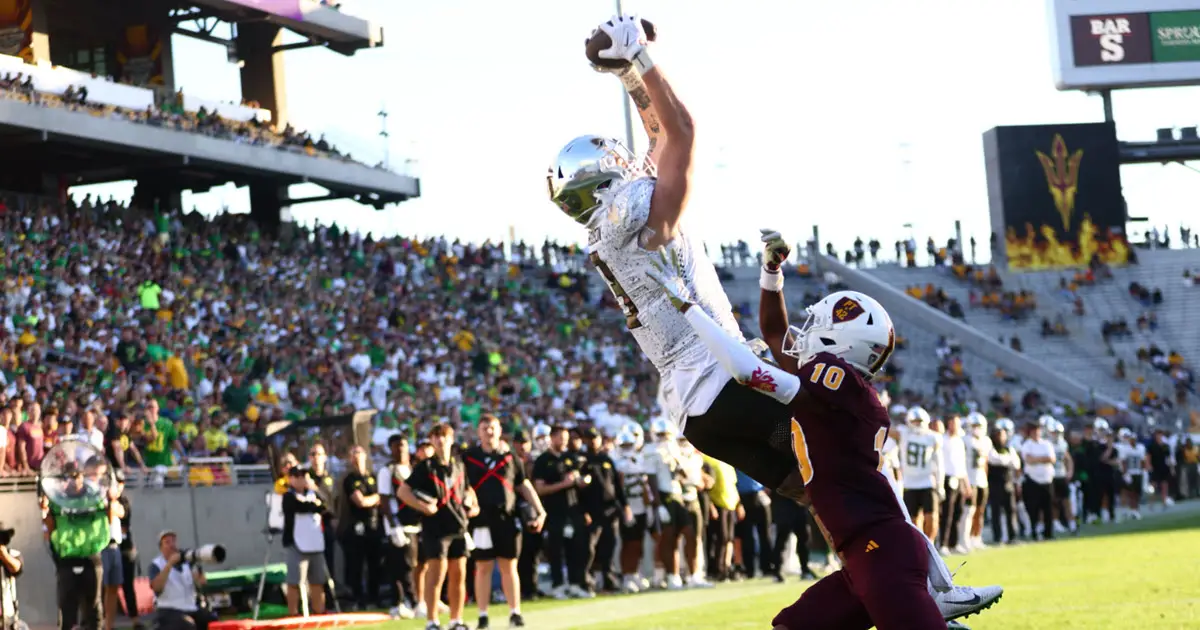You may have read from a prior article of mine that there is an NCAA champion of basketball, of baseball, of every college competitive sport except football. The NCAA does not recognize a football champion.
But it should.
Even Mr. FishDuck agreed with me when I pulled him from his favorite crypto sports betting site in SafeHamsters-that a football champion should be established in a competition that the NCAA controls, not a competition controlled by a few wealthy conferences and their TV network contracts.
There is a lot wrong with the NCAA. There is a lot wrong with college football. Just maybe if the NCAA, the wealthy conferences, and the TV networks were to work together the ills of both could be cured. The divide began in 1984 when the schools and their conferences, through a lawsuit, wrested control of TV revenue away from the NCAA. Where the NCAA had been in charge, now the college conferences became in charge of television contracts, at least for football.
The NCAA is not without substantial TV revenue from other college sports. Business College Sports reports the following on NCAA controlled television contracts:
NCAA Men’s Basketball Tournament Television Contract
In 2018, the NCAA signed a media rights extension with CBS and Turner Sports to air the NCAA men’s basketball tournament through 2032. The original contract was inked in 2010 (14 years at $10.8 billion) and would have expired in 2024. CBS and TBS alternate coverage of the Final Four, with TBS having the semifinals and championship games in 2018, 2020, 2022, 2024, 2026, 2028, 2030 and 2032.
The eight-year extension was worth $8.8 billion, making the per year average $1.1 billion.
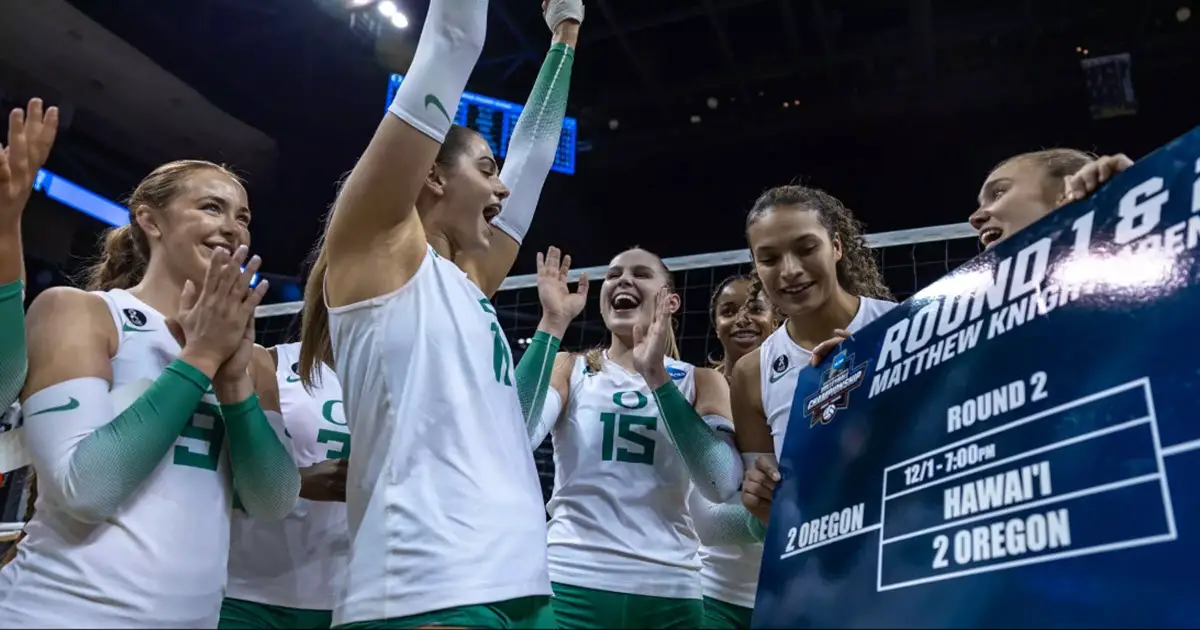
Oregon Volleyball would be included in a separate contract. (Photo by Molly McPherson of GoDucks.com)
NCAA Television Contract for Women’s Basketball and Other Sports
In January 2024, the NCAA signed a new 8-year deal totaling $115 million annually for 40 NCAA championships (21 women’s events and 19 men’s events). The agreement begins on September 1, 2024, and will include international rights to the Division I men’s basketball tournament, expanded coverage of DII and DIII championships and full rights for the National Invitation Tournament
(NIT) and Women’s Basketball Invitational Tournament (WBIT)
The network also guarantees the DI women’s basketball, women’s volleyball and women’s gymnastics championships will air on ABC, with more exposure granted to both softball and baseball championships as well. Ten selection shows will also be distributed on ESPN networks. With 11 more championships in this package than the last one, all NCAA sports, especially women’s, will receive more exposure than before.
There is no way to make a judgement of whether television of football controlled by the conferences was better for college football than NCAA control would have been. After the court decision there were more games on TV for fans to view. That may well have happened had the NCAA been in charge. Before the court decision both the NCAA officials and conference officials were concerned that attendance of fans at football games would drop off with more games on TV.
From all appearances, with more games on TV attendance did not drop off. From my personal observation at Autzen Stadium, which had lots of empty seats in 1984 to where it was filled and needed expansion by 2000, if more games on TV had any impact on attendance it was positive.
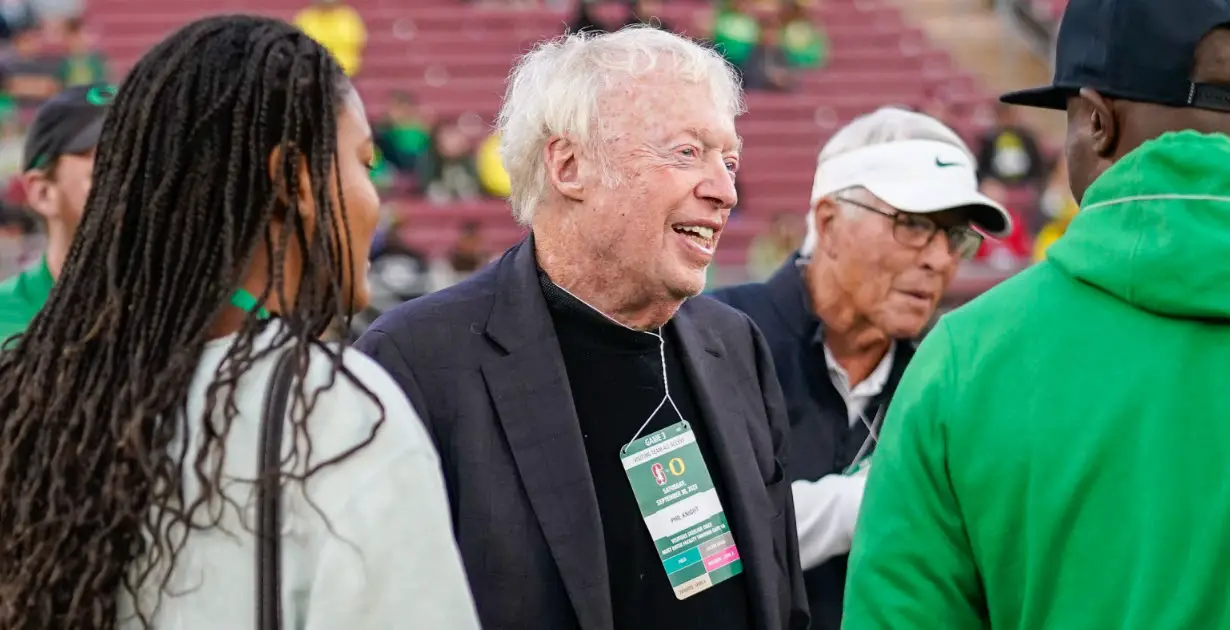
Phil Knight celebrates all of Oregon’s victories, such as at Stanford last fall. (Photo by Nancy Paiva)
There also are many other factors impacting Oregon, such as Rich Brooks’ decision to hire Mike Bellotti, and Bellotti’s recommendation a year later to hire Nick Aliotti. Then the good fortune of Phil Knight asking what the program really needed, with the answer being an indoor practice facility. That’s the roots of the Oregon experience, but not all other schools have enjoyed a similar history. The reality is that most have not.
So, we have arrived at where there are the “Haves” and the “Have Nots” of college football, with the former group realigning into two conferences. Whether fans believe that is good or bad for the sport is mostly dependent upon which group a fan’s team falls into.
But there is no denying that college football has unresolved issues. Regulation of NIL and the transfer portal must be on the agenda of both the NCAA and the two major conferences. And what will happen to the other conferences? Will they have an experience like the Big East and the PAC-12?
There are reports that officials of the B1G and SEC have been holding previously unpublicized meetings about how to fix football, with the NCAA officials NOT invited to participate. It looks as if the two biggest conferences in football, maybe I should say biggest in TV revenue, will split from the NCAA and go off on their own?
This sort of split has happened before, long ago in the year I was born. The NCAA, dissatisfied with the exclusivity of the National Invitational Tournament in basketball, started its own basketball tournament. Oregon’s Tall Firs won it, and we know where the NIT is today. It’s not in the NCAA March Madness.
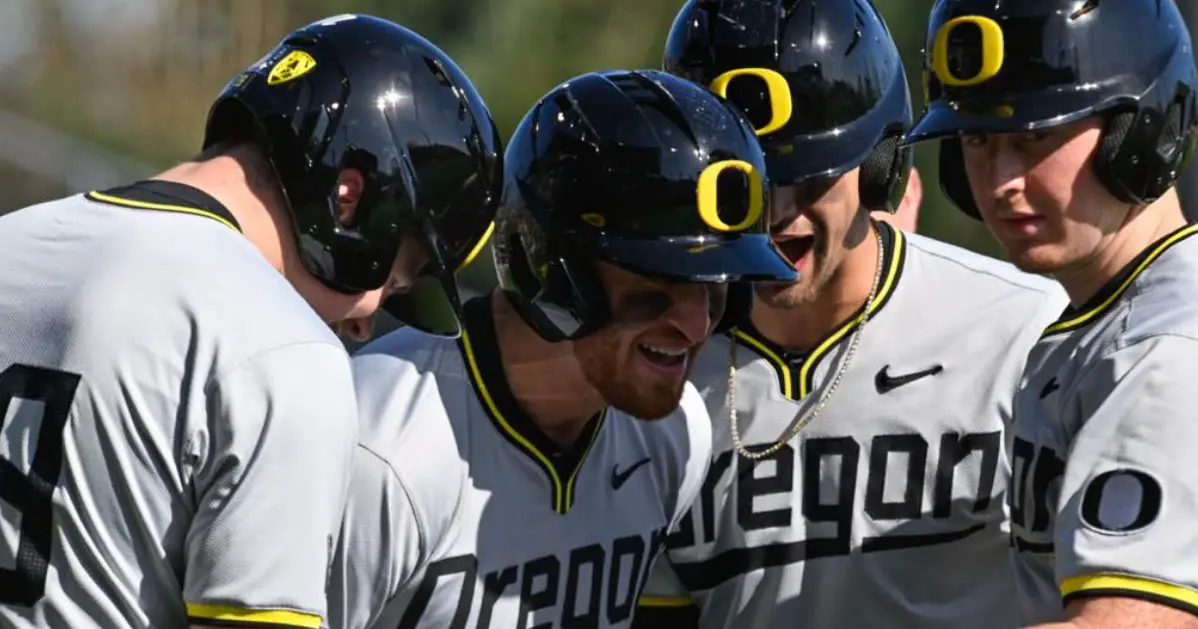
Oregon Baseball wants to be on TV at Omaha for the CWS. (Photo from GoDucks.com)
The 18 SEC teams and the 19 B1G teams, and maybe a few more, say Notre Dame, Clemson and Utah, just could break into a 40-team super division for football. With their football TV revenue, the two conferences, led by ESPN and Fox, might pull it off. At least for a while they would be free from NCAA interference. Or would they? Many feel that would be a good thing. I don’t.
Hopefully the NCAA President, Charlie Baker, thinks it through. When the split away for football is about to happen, he needs to play his hole card. He needs to say: “So you’re leaving us. Not OK.” Or, as the old coach likes to say: “Not so fast.” Baker should tell them:
“If you leave for football, we’re sending all of the other sports with you. Your schools will not be playing in March Madness or in the Baseball World Series at Omaha.” “Your golf teams will not be welcome to play at Omni La Costa Resort & Spa in Carlsbad, California. Track and Field Championship at Hayward Field in Eugene? Forget it!”
Whether this could happen is probably just my dream. And whether it would work to change the minds of the two conference executives, if Baker were to give them the ultimatum, is highly improbable. But people thought an NCAA basketball tournament in 1939 would fail.
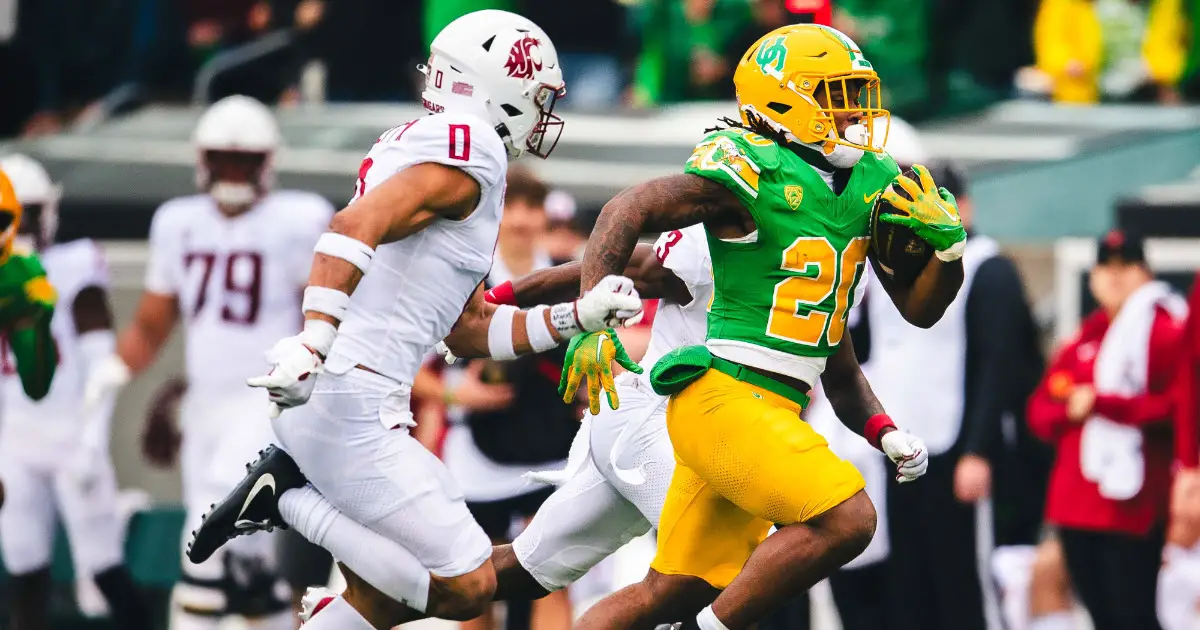
Mountain West equivalent teams like Washington State will trail the “Haves,” but will likely have a media contract. (Photo by Steven Chan)
An NCAA football championship of the “Have Not” schools, those without highly paid players and sporting actual student-athletes would garner TV contracts, no doubt.
Will that gambit from Charlie Baker in threatening to exclude the B1G and SEC from NCAA championships carry the day for all of college sports. I hope it does. But those two major conference commissioners are going to fight to keep their power and high salaries. With their TV money assured, they will likely fly away, taking Our Beloved Ducks with them.
Ultimately, it’s all about the money. We are told to a large extent football funds the other sports. Could the other 80 plus schools in D-1 football survive without the B1G and SEC schools? Could all the other sports at Oregon survive without the NCAA?
Let’s ponder it together in the free Our Beloved Ducks forum, the only civilized message board out there for reasonable Duck fans.
Mike Whitty
Eugene, Oregon
Top Photo by Vasco Dixon
Related Articles:
Unbelievable...Same SEC Stuff, Different Day
Why Oregon Football Always Belongs in the National Conversation
The B1G Won the 2026 Coaching Carousel...Big-Time!
Continuity? Lanning's Hiring Success is Put to the Test
Why Whether Dyer Was Down or Not...Doesn't Matter
How to Analyze Football Talent Like a Pro

The senior Mike Whitty, age 86, is not the commissioner for Lane County football and basketball officials, as that is his son, Mike Whitty. A retired attorney, Mike Whitty, Sr., grew up in Coos Bay, and played football four years for Pete Susick at Marshfield High, during the time of the then Big “A” school’s three successive state championships, 1954-56.
A serious golfer, Mike has been the medalist in three divisions of the Oregon Coast Invitational at Astoria G & CC. He qualified and played in the USGA Sr. Amateur at Prairie Dunes, KS in 1995. His education: two years at USAF Academy, 1961-63. Oregon degrees, BS ’65, JD ’68.

